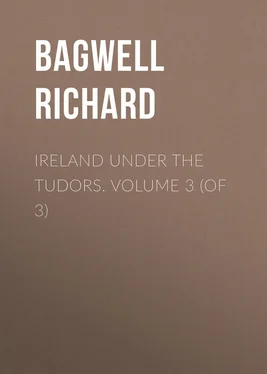Richard Bagwell - Ireland under the Tudors. Volume 3 (of 3)
Здесь есть возможность читать онлайн «Richard Bagwell - Ireland under the Tudors. Volume 3 (of 3)» — ознакомительный отрывок электронной книги совершенно бесплатно, а после прочтения отрывка купить полную версию. В некоторых случаях можно слушать аудио, скачать через торрент в формате fb2 и присутствует краткое содержание. Жанр: foreign_antique, foreign_prose, на английском языке. Описание произведения, (предисловие) а так же отзывы посетителей доступны на портале библиотеки ЛибКат.
- Название:Ireland under the Tudors. Volume 3 (of 3)
- Автор:
- Жанр:
- Год:неизвестен
- ISBN:нет данных
- Рейтинг книги:3 / 5. Голосов: 1
-
Избранное:Добавить в избранное
- Отзывы:
-
Ваша оценка:
- 60
- 1
- 2
- 3
- 4
- 5
Ireland under the Tudors. Volume 3 (of 3): краткое содержание, описание и аннотация
Предлагаем к чтению аннотацию, описание, краткое содержание или предисловие (зависит от того, что написал сам автор книги «Ireland under the Tudors. Volume 3 (of 3)»). Если вы не нашли необходимую информацию о книге — напишите в комментариях, мы постараемся отыскать её.
Ireland under the Tudors. Volume 3 (of 3) — читать онлайн ознакомительный отрывок
Ниже представлен текст книги, разбитый по страницам. Система сохранения места последней прочитанной страницы, позволяет с удобством читать онлайн бесплатно книгу «Ireland under the Tudors. Volume 3 (of 3)», без необходимости каждый раз заново искать на чём Вы остановились. Поставьте закладку, и сможете в любой момент перейти на страницу, на которой закончили чтение.
Интервал:
Закладка:
The whole document is a good example of the sanguine rhetoric in which exiles have always indulged, and of the way in which the leaders of Irish sedition have been accustomed to talk. The part assigned to continental powers and to English Catholics in the sixteenth century, was transferred to the French monarchy in the seventeenth, and to the revolutionary republic in the eighteenth; and now, in the nineteenth, it is given to the United States of America, and to the British working-man.
A translation of the shorter paper may well be given in full: – ‘A just war requires three conditions – a just cause, lawful power, and the means of carrying on lawful war. It shall be made clear that all three conditions are fulfilled in the present case.
‘The cause of this war is God’s glory, for it is our care to restore the outward rite of sacrifice and the visible honour of the holy altar which the heretics have impiously taken away. The glory of Christ is belied by the heretics, who deny that his sacraments confer grace, thus invalidating Christ’s gospel on account of which the law was condemned; and the glory of the Catholic Church they also belie, which against the truth of the Scriptures they declare to have been for some centuries hidden from the world. But in the name of God, in sanctification by Christ’s sacraments, and in preserving the unity of the Church, the salvation of us all has had its chief root.
‘The power of this war is derived first from natural, and then from evangelical, law. Natural law empowers us to defend ourselves against the very manifest tyranny of heretics, who, against the law of nature, force us, under pain of death, to abjure our first faith in the primacy of the Roman Pontiff, and unwillingly to receive and profess a plainly contrary religion; a yoke which has never been imposed by Christians, Jews, or Turks, nor by themselves formerly upon us. And so since Christ in his gospel has given the help of the kingdom of heaven – that is, the supreme administration of his Church – to Peter, Gregory XIII., the legitimate successor of that chief of the Apostles in the same chair, has chosen us general of this war, as abundantly appears from his letters and patent (diploma), and which he has the rather done that his predecessor, Pius V., had deprived Elizabeth, the patroness of those heresies, of all royal power and dominion, as his declaratory decision (sententia), which we have also with us, most manifestly witnesseth.
‘Thus we are not warring against the legitimate sceptre and honourable throne of England, but against a she-tyrant who has deservedly lost her royal power by refusing to listen to Christ in the person of his vicar, and through daring to subject Christ’s Church to her feminine sex on matters of faith, about which she has no right to speak with authority.
‘In what belongs to the conduct of the war, we have no thoughts of invading the rights of our fellow-citizens, nor of following up private enmities, from which we are especially free, nor of usurping the supreme royal power. I swear that God’s honour shall be at once restored to Him, and we are ready at any moment to lay down the sword, and to obey our lawful superiors. But if any hesitate to combat heresy, it is they who rob Ireland of peace, and not us. For when there is talk of peace, not with God but with the Devil, then we ought to say, with our Saviour: I came not to bring peace on earth, but a sword. If then we wage continual war to restore peace with God, it is most just that those who oppose us should purchase their own damnation, and have for enemies all the saints whose bones they spurn, and also God himself, whose glory they fight against.
‘Let so much here suffice, for if anyone wishes to understand the rights of the case he need but read and understand the justice and reasonableness of the fuller edict which we have taken care should be also published.’ 16 16 These two declarations are at Lambeth. In the Carew Calendar , they are wrongly placed under 1569, when Pius V. was still alive. They are printed in full in the Irish (Kilkenny) Archæological Journal , N.S. ii. 364.
In these papers the arguments derived from the right to liberty of conscience, which all Protestants should respect, and from the Papal claims which all Protestants deny, are blended with no small skill; but Fitzmaurice, while demanding liberty of conscience for himself, expressly denies it to those who disagree with him.
There can be no doubt that Desmond was jealous of James Fitzmaurice; and historians well-affected to the Geraldines have attributed the latter’s rebellion to the ill-feeling existing between them. It is said that Lady Desmond, who was a Butler, had prevented her husband from making any provision for his distinguished kinsman. It was reported to Drury that Fitzmaurice had called himself Earl of Desmond on the Continent, and that this would be sure to annoy the Earl, whose pride was overweening. But this does not seem to have been the case. Fitzmaurice is not called Earl either in his own letters or in those written to him. The general of the Jesuits addresses him as ‘the most illustrious Lord James Geraldine’; the Pope speaks of him as James Geraldine simply, and so he calls himself, sometimes adding ‘of Desmond.’ But that he should have been appointed general of a force which was to operate in Desmond’s country was quite enough to excite suspicion. No sooner did the news of his arrival reach the Earl than he wrote to tell Drury that he and his were ready to venture their lives in her Majesty’s quarrel, ‘and to prevent the traitorous attempts of the said James.’ He had nevertheless been in correspondence with Fitzmaurice, and had urged his immediate descent upon the Irish coast some eighteen months before. 17 17 Desmond to Drury, July 19, 1579; Russell. The letter from Desmond’s servant, William of Danubi, to Fitzmaurice, calendared under July 1579 (No. 37) certainly belongs to the end of 1577, just after Rory Oge had burned Naas.
Not less important than Fitzmaurice was Dr. Nicholas Sanders, who acted as treasurer of the expedition. He was known by the treatise De Visibili Monarchia which Parker said was long enough to wear out a Fabius, and almost unanswerable, ‘not for the invincibleness of it, but for the huge volume.’ Answers were nevertheless written which no doubt satisfied the Anglican party, but the Catholic refugees at Brussels thought so highly of Sanders that they begged Philip to get him made a cardinal.
The English were then in disgrace at Rome, where the appointment of a Welshman as Rector of the new college had caused a mutiny among the students, and Allen doubted whether his own credit was good, but it was upon him that the red hat was at last conferred. To Sanders must be ascribed most of what was written in Fitzmaurice’s name, and that was a small part of what fell from his prolific pen. Queen Elizabeth, said the nuncio, was a heretic. She was childless, and the approaching extinction of Henry VIII.’s race was an evident judgment. She was ‘a wicked woman, neither born in true wedlock nor esteeming her Christendom, and therefore deprived by the Vicar of Christ, her and your lawful judge.’ Her feminine supremacy was a continuation of that which the Devil implanted in Paradise when he made Eve Adam’s mistress in God’s matters.’ When a knowledge of Celtic was necessary Sanders’s place might be taken by Cornelius O’Mulrian, an observant friar, lately provided to the see of Killaloe, or by Donough O’Gallagher, of the same order, who was provided to Killaloe in 1570. Letters in Irish were written to the Munster MacDonnells, Hebridean gallowglasses serving in Desmond, whom Fitzmaurice exhorts to help him at once – ‘first, inasmuch as we are fighting for our faith, and for the Church of God; and next, that we are defending our country, and extirpating heretics, barbarians, and unjust and lawless men; and besides that you were never employed by any lord who will pay you and your people their wages and bounty better than I shall, inasmuch as I never was at any time more competent to pay it than now… We are on the side of truth and they on the side of falsehood; we are Catholic Christians, and they are heretics; justice is with us, and injustice with them… All the bonaght men shall get their pay readily, and moreover we shall all obtain eternal wages from our Lord, from the loving Jesus, on account of fighting for his sake… I was never more thankful to God for having great power and influence than now. Advise every one of your friends who likes fighting for his religion and his country better than for gold and silver, or who wishes to obtain them all, to come to me, and that he will find each of these things.’ 18 18 James Fitzmaurice to Alexander, Ustun, and Randal MacDonnell, July, 1579; these letters, with translation, were printed by O’Donovan in Irish (Kilkenny) Archæological Journal , N.S. ii. 362; Strype’s Parker , lib. iv. cap. 15, and the appendix; Sanders to Ulick Burke in Carew , Oct. 27, 1579. In Cardinal Allen’s Memorials is a letter dated April 5, 1579, in which Allen calls Sanders his ‘special friend.’
Интервал:
Закладка:
Похожие книги на «Ireland under the Tudors. Volume 3 (of 3)»
Представляем Вашему вниманию похожие книги на «Ireland under the Tudors. Volume 3 (of 3)» списком для выбора. Мы отобрали схожую по названию и смыслу литературу в надежде предоставить читателям больше вариантов отыскать новые, интересные, ещё непрочитанные произведения.
Обсуждение, отзывы о книге «Ireland under the Tudors. Volume 3 (of 3)» и просто собственные мнения читателей. Оставьте ваши комментарии, напишите, что Вы думаете о произведении, его смысле или главных героях. Укажите что конкретно понравилось, а что нет, и почему Вы так считаете.












